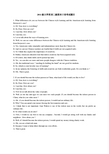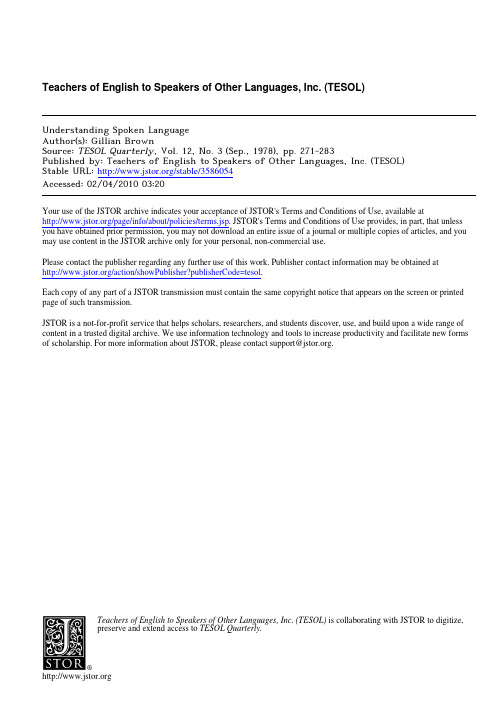Spoken English
2020人教版九年级英语上Unit1课文重难点讲解

【文库独家】Unit 1 How can we become good learners?SectionB -Self Check课文重难点讲解1.I can’t understand spoken English.【解析】speak→spoke →spoken v说【注】部分动词的过去分词也可做该词的形容词:spoken 口语的broken 坏掉的written 写作的Reading aloud is good for your _____________(speak) English.spoken English 英语口语written English 书面英语speaking skills 口语技巧an English-speaking country 一个说英语的国家【辨析】speak/talk/say/tell(1) 说某种语言用speak speak English 说英语(2) 与某人交谈用talk talk with sb.= talk to sb. 与某人交谈(3) 强调说话内容用say say it in English 用英语说(4) 告诉某人用tell tell sb. to do sth 告诉某人做某事【记】He wants to improve his __________ English, by ________English with native ____________.(speak)①Can you understand ________(speak) English?( )②______ well is very useful to us all.A. Speak EnglishB. Speaking EnglishC. Spoken EnglishD. Speaks【重庆中考】—The radio ______ that there will be another heavy rain inGuangdong.—Too bad. It has rained for the whole week.A. tellsB. talksC. saysD. speaks2.I don’t know how to increase my reading speed【解析】“疑问词+动词不定式”作宾语注:what to do 后不需要跟宾语how to do 后必须跟宾语【拓展】“疑问词+动词不定式”结构:know(知道),tell(告诉)wonder(想知道)ask(问) find out (发现) learn (学会) +what , which, when,where, how +动词不定式(to do)①I don’t know how _______(use) commas.( )②—We can use QQ to communicate with each other online.—Good. Will you please show me ___?A. which to useB. how to use itC. what to useD. where to use it3. I make mistakes in grammar【解析】mistake→mistook →mistaken v错误(1) make mistakes 放错make mistakes in在某方面放错(2) mistake …for… 把…误认为… (3) by mistake 错误地。
Spoken English(英语口语)

英语说话的作文

英语说话的作文Title: The Art of Spoken English。
English, the lingua franca of our modern world, holds immense power. Mastering spoken English opens doors to communication, education, and opportunity. In this essay,we delve into the nuances of spoken English, exploring its importance, challenges, and strategies for improvement.Firstly, let's acknowledge the significance of spoken English. In today's globalized society, effective communication is paramount. Whether in business negotiations, academic discussions, or casual conversations, proficiency in spoken English facilitates clarity and understanding. Moreover, it fosters cultural exchange and mutual respect, bridging gaps between people of diverse backgrounds.However, mastering spoken English is not without its challenges. Pronunciation, intonation, and fluency areareas where many learners struggle. Accents vary widely across regions and countries, further complicating comprehension. Additionally, idiomatic expressions and colloquialisms pose hurdles for non-native speakers, requiring familiarity with cultural nuances.So, how can one improve their spoken English skills? The journey begins with a strong foundation in grammar and vocabulary. A thorough grasp of sentence structure and word usage forms the basis for coherent communication. Beyond that, practice makes perfect. Engaging in conversations with native speakers, joining language exchange programs, and participating in group discussions are invaluable opportunities for honing spoken English skills.Listening plays a pivotal role in improving spoken English. By actively listening to English speakers, learners can pick up on pronunciation patterns, intonation variations, and idiomatic expressions. Watching English movies, listening to podcasts, and following English news channels are effective ways to immerse oneself in the language.Furthermore, mimicking native speakers can aid in improving pronunciation and intonation. Shadowing, a technique where learners repeat sentences spoken by native speakers, helps develop a natural rhythm and flow in speech. It's akin to learning a musical instrument—repeatedpractice leads to proficiency.Another aspect to consider is confidence. Many non-native speakers feel self-conscious about their English abilities, fearing ridicule or judgment. Overcoming this mental barrier is crucial. Embracing mistakes as learning opportunities and maintaining a positive attitude can boost confidence levels. Remember, everyone makes mistakes, even native speakers.Moreover, cultural sensitivity enhances spoken English proficiency. Understanding cultural references, norms, and etiquette contributes to effective communication. It's not just about mastering the language; it's also about understanding the context in which it is used.In conclusion, spoken English is a powerful tool that opens doors to countless opportunities. While mastering it may pose challenges, with dedication, practice, and a positive mindset, anyone can improve their spoken English skills. So, let's embark on this journey of linguistic mastery, one conversation at a time.。
人教版英语七年级课件PPT Spoken English

Work quietly!
ENTER THE TITLE HERE
Please enter the text you need here.
ENTER THE TITLE HERE
Please enter the text you need here.
ENTER THE TITLE HERE
Please enter the text you need here.
Please enter the text you need here. Please enter the
text you need here. Please enter the text you need
here. Please enter the text you need here. Please enter the
ENTER THE TITLE HERE
Please enter the text you need here.
ENTER THE TITLE HERE
Please enter the text you need here.
ENTER THE TITLE HERE
Please enter the text you need here.
My favourite seUanisto1n
My favourite season
PLEASE ENTER THE TITLE HERE
Please enter the text you need here. Please enter the text you need here. Please enter the text you need here.
Please enter the text you need here. Please enter the text you need here
经典 Spoken English

1.I wasn't born yesterday.(我又不是三岁小孩)2.How do I address you?(我怎么称呼你)3.She turns me off.(她使我厌烦。
)4.So far so good.(目前为止,一切都好。
)5.Be my guest.(请便、别客气)6.That was a close call.(太危险了/千钧一发)7.Far from it.(一点也不。
)8.It's a pain in the neck[麻烦的事(人)].(那真是件麻烦事)9.We're in the same boat.(我们处境相同。
)10.My mouth is watering.(我在流口水了。
)11.I ache all over.(我浑身酸痛。
)12.I have a runny nose.(我流鼻涕。
)13.Do you have any openings?(你们有空缺吗?)14.Think nothing of it.(别放在心上。
)15.I'm not myself today.(我今天心神不宁。
)16.I have a sweet tooth.(我喜欢吃甜食。
)17.For the time being.(暂时;暂且;目前)18.Don't beat around the bush. (别拐弯抹角了。
)19.It's up on the air[悬而未决].(尚未确定。
)20.It slipped my mind.(我忘了。
)21.You can't please[使人感到满意和愉快] everyone.(你不可能讨好每一个人。
)22.I'm working on[着手;从事] it.(我正在努力。
)23.You bet!(当然!)24.Drop me a line[短信].(写封信给我)25.Are you pulling my leg[同某人开玩笑;取笑]?(你在开我玩笑吗?)26.I'll keep my ears open.(我会留意的。
Spoken English

以下是在网上收集到的美国人常用的spoken English,然后根据朋友传授的在美国日常生活中真正听到的进行了删选!quit it! 别闹!Don't mention it. 没关系,别客气。
Who knows! 天晓得!It is not a big deal! 没什么了不起!How come…怎么回事,怎么搞的。
Don't push me. 别逼我。
Come on! 快点,振作起来!(come on的含义很多,主要体现在语气上,使用时请注意语气)Have a good of it.玩的很高兴。
It is urgent. 有急事。
What is the fuss?吵什么?Still up?还没睡呀?It doesn't make any differences. 没关系。
Don't let me down. 别让我失望。
God works. 上帝的安排。
Hope so. 希望如此。
get to the point言归正传。
(go down to business我感觉没有get to the point常用,所以换掉)None of my business. 不关我事。
It doesn't work. 不管用。
I'm not going. 我不去了。
Does it serve your purpose?对你有用吗?I don't care. 我不在乎。
Not so bad. 不错。
No way! 不可能!Don't flatter me. 过奖了。
Your are welcome. 你太客气了。
It is a long story. 一言难尽。
Between us. 你知,我知。
Big mouth! 多嘴驴!Sure thin! 當然!(我觉得Sure更加popular! I like to use SURE...)I''m going to go. 我這就去。
Spoken English口语小知识

ə听力听不懂两个原因 1.词汇量不足2.不懂听力技巧美音:t 弱化为d听力技巧:表原因reason because why so therefore.表转折but however停顿口语speak loudly连读:元音+元音:一个单词结尾是/i://e i//a i//ɔi/+元音;加入半元音/j/ 元音+元音一个单词结尾是/u//əu//a u/+元音加入半元音/w/变音:/s/+/j=/ʃ/、/d/+/ j /=/dʒ/、/ t /+/ ʃ /=/ tʃ /、/t/+/j/=/tʃ//s/+/ ʃ /=/ ʃ /、/dz/+/j/=/ dʒ /、/ts/+/v/=/ tʃ /、/z/+/j/=/ʒ/、口语Do you charge for handing ?你们收手续费么?How much is the handing free?Duty-free shop免税店Admission ticket 门票It has expired .过期了In total总共I don’t order this .我没定这道菜。
How much do i owe you 我要付多少钱?Adult tickets 成人票Child tickets 儿童票Senior tickets 老年票quality for 名词/doing 有什么资格做某事Hot top 火锅Report sth to someone. 举报某人3.21 come with 与......一起供给It comes with a Coke or a juice.是的,它搭配一杯可乐或者果汁。
Go easy on the onions on the burger please. 汉堡上请少放点洋葱。
3.22Call an ambulance 叫救护车It was a hit-and-run 这是一起肇事逃逸事件。
Take off 脱下衣服飞机起飞。
大学英语二级期末口语考试题目 Spoken English Test

2011级大学英语二级期末口语考试题目1. What differences do you see between the Chinese-style learning and the American-style learning from Benjamin’s case?A: HI, Tom, how is everything?B: Hi, Peter. How are you?A: I am fine. How about you?B: I am fine, too.A: Let us talk about the ways of learning now.B: Well, we can see some differences between the Chinese-style learning and the American-style learning from Benjamin’s case.A: Yes. Americans value originality and independence more than the Chinese do.B: And we can see Chinese teachers are fearful that if skills are not acquired early.A: So I think they neglect the importance of creativity.B: Rather, American educators fear that unless creativity has been acquired early.A :Of course ,they think skills can be picked up early.B: Yes , we can also see more and more people disagree with the Chinese tradition.A: Oh, the traditional ways “ teaching by holding his hand” are not good for students.B: So, which is your favorite way of learning?A: In my opinion, the fostering of skills and creativity are both worthwhile goals. Do you think so ?B: Oh , That is great .2. If you should become the richest person in China, what kind of life would you like to live?A: HI, Tom, how is everything?B: Hi, Peter. How are you?A: I am fine. How about you?B: I am fine, too.A: Now let us talk about the value of people.B: Well ,in our day and ages we can meet two such people .If you should become the richest person in China, what do you value most ?A: Oh , if you should become the richest person ,I would lead an ordinary life .B: Why? You can spend your money buying the best mansion and cars .A: I think that is not important .Sam Walton is one of the richest men in the world, but ,he prefer an ordinary life .B: So what would you do also?A: First, I would try my best to run my company . Second, I would get along well with my family and neighbors . How about you ?B: Well ,if I should become the richest person, I would spend my money doing charity work.A: Oh, you are a kind rich manB: Because I want to help others through my own efforts.A: That is great.Bill Gates and Mother Teresa, who is more important to the world?A: HI, Tom, how is everything?B: Hi, Peter. How are you?A: I am fine. How about you?B: I am fine, too.A: Now let us talk about Bill Gates and Mother Teresa.B:Ok,they are both the famous person.A; Do you think who is more important to the world?B: In my opinion , Mother Teresa is more important to the world.A: Why?B: Because. She cared for the poor and moved other people to care the poor. I think love is more important. How about you ?A: Well, I think Bill Gates is more important to the world.B: You think money is more important?A: Yes. Money is the foundation of what we do in the world.B: But if the world has more people like Mother Teresa rather than Bill Gates , the world can be more easy A :If she didn't have money , she can not pay all her attention to the poor children .B: So may it is better to use money and love to develop the world.A: Oh ,that is great.What kind of music do you like? How does music influence our lives?A: HI, Tom, how is everything?B: Hi, Peter. How are you?A: I am fine. How about you?B: I am fine, too.A: What do you think about the music ?B: Well, I am keen on it, Music is really good for relaxing ourselves and giving us a good mood.A: Yeah, I really agree with you. What kinds of music do you like best?B: I prefer soft music. such as some pop music, or some quiet music.A: Er, but rock music is my favorite.B: Ok, so do you have a favorite song ? in the pop music area, I think that Westlife perform well. some songs are well known by most younger. For example, my love. You know, when you hear that, it cannot ignore the strong emotion of love they show.A:I am quiet with you here. Although I am not favor at this, i still can feel it as i hear in the first time.B: In my opinion, I really think that pop music is a little noisy for me. I just can't keep calm hearing it.A: yes, that is also why I like it. It shows that kinds of exiciting feeling. And I like some pop music created by Negro.B: all right, I know that. Different people have different favor, however, music have the same function making us feel relax and taking a rest at that moment . Do you think so?A: Exactly~~B: I will call you. Bye!A: Bye! Have a good day!B: You, too.Why do people have pets? Do you want to keep a pet? If not, please state your reasons.A: HI, Tom, how is everything?B: Hi, Peter. How are you?A: I am fine. How about you?B: I am fine, too.A : Now let us talk about pets.B: Well, more and more people have pets. Why do people have pets?A:I think people keep a pet as their friend.B: Oh, of course, pets are cute .They are friendly to people.A: Do you want to keep a pet?B: Maybe not. I don not want keep it.A: Why?B: If you keep a pet, you have to spend much money and energy on it. It is not worthwhile to do it. How about you?A: I don’t think so. I think sometimes it is easy to get along.B: But Pets may do harm to children. we have to pay more attention to care it.A: I think if we give some care to pets, they may be safe to people.-B: Oh ,good .That seems it is easy for you to keep a pet,A: Yes.6. What are the positive and negative effects of a virtual life?A: these years, internet has become more and more popular and more and more people have their virtual lives on it. What do you think about the positive and negative efforts of the virtual life?B: With more and more virtual ways of communicating, buying goods and gaining news, people’s life does become more and more convenient. But I don’t think these above mean to ‘virtual life’. I think ‘virtual life’ means people spend all time and do all things on the internet. Although it does facilitate people’s life, but if you swallow yourself in it and depend on the virtual ways doing all things whole days, the effects of the virtual life will be negative .A: yeah, virtual life not only may lead to laziness but also form obstacles of communicating with words through mouth. It’s comfortable to do any thing at home front of your computer via the internet, but it may fade the color of real life and social skills of people. I don’t think it’s a good life style, too.B: but sometimes, on the contrary, addicting oneself into the virtual life one or two days a month maybecan relax people.A: I can’t agree more.7. Do you give your trust in the net-friends? And why?A: Good morning.B: Good morning. How are things going these days?A: Not so bad. Thank you. Do you give your trust in the net-friends? A few days ago I made a new friend on the Internet. He is a basketball fans too. So I began to chat with him about this NBA season.B: How do you think of your new friend?A: I’m not quite sure. We just began to kwon each other.B: Well, in my opinion. If the man I meet in the Internet is related with me, such as the student in the same school I didn’t acquaint, I’ll make friend with her. We must pay attention to the liar on the Internet. So if I have no relationship with her, I’ll not give trust to her easily.A: I can’t agree you anymore. Nowadays many people are cheated by their net-friends. So it can not be careful enough to make friends through the Internet. If he ask me for money or for my private information, I’ll get away from him.B: Caution is the parent of safety..A: That’s right. Thank you for your suggestions.8. Besides hard working, are there other elements which are essential to success?A: after learning the unit 5, I believe firmly that hard working can promote oneself. And when it comes to the success, are there any things else essential?B: maybe interest and insisting are so important. If you don’t like this thing, you won’t spear no effort on it, that is to say, you can’t totally concentrate on it when you are doing it. So maybe you wouldn’t keep holding it and you gave up. Then, you can’t succeed.A: Yes. But in my opinion, self-understanding and self-responsibility are more critical than interest. Interest is important, but it is not convenient to you. So even you swallow yourself into it, the result maybe will not be successful. Nevertheless, if you know what you are good at, and chose to insist it, you can success.B: but why did you say self-responsibility is more important?A: because the thing you chose may not your favorite, to insist on it, you need self-responsibility to make yourself undertake all the results caused by your choices.B: I think you are right. Life is just once, and doing convenient things is more important than doing interesting things. and we all must undertake our responsibility to insist and to promote.Besides, that the convenient thing is the interesting thing is better.A: I cant agree more9. What have you learnt from Michael Stone’s story (unit 5 True Height)?A: Good morning.B: Good morning.A: How are things going these days?B: Everything is all right. Thanks. How about you?A: It’s Ok. Thank you. Have you read the story about the Michael Stone. The story impressed me a lot. B: Of course. What a tough man. Although he is a disability man, he still try his best to conquer the difficulties in his unfair life. He didn’t complain the fate depriving his intact body. After reading his story, I was lost in thoughts.A: I also learnt a lot from his story. As his motto says “If you want something, work for it”The fate abandon him, but he didn’t give up. He worked for his dreams and proved that he can succeed as other normal people. So when we meet some difficulties in our daily lives, don’t be scare and just overcome them. Anything can be defeated.B: I think so. We also have dreams. That dream can be a power when we overcome the trouble in our lives. If you want to succeed, hard working is also necessary. No pains no gains.A: I appreciate your opinions.10. Some think that women should stay at home assisting their husband and looking after their children while others think that women should go out to work. What is your opinion? Please use specific examples to support yourself.A: Good morning.B: Good morning. How do you do?A: I’m fine thank you, and you?B: it’s Ok, Nowadays, women are playing more and more important role in our modern lives. A hundred years ago, women’s position in society was lower than men,. During that time, most women were stay at home to do housework and look after the children. But now, this situation has changed a lot. What’s your opinion about the changes of women’s social position?A: I think women should have the same rights as the men have. A woman can learn anything a man can. They should have rights to study, to work and they can play more important role in social lives. What’s more, women have the advantages that men do not have.B: I agree with you. There are many outstanding women in history, for example, Song Qinling, has contributed a lot to our democratic revolution.A: And Marie Curie is another example, she is a great Physicist, and won the Nobel Prize.B: They proved that women can do better than men.总分(30分)Scoring Criteria:1. 语音语调: 10分(10 8 6 4 2 0)2. 词汇语法: 10分(10 8 6 4 2 0)3. 互动交际: 5 分(5 4 3 2 1 0)4. 连贯表达: 5 分(5 4 3 2 1 0)两人对话时间:3分钟左右(三人以上,对话时间应适当延长)。
Authentic Spoken English

Authentic Spoken English1.关于音标①音标是练好地道口音的基础,包括嘴型、舌位、发声位置等。
②音标体系:国际音标(International Phonetic Alphabet,缩写:IPA),早期又称万国音标,是一套用来标音的系统,以拉丁字母为基础,由国际语音学学会设计来作为口语声音的标准化标示方法。
大陆英语教材、各类词典中常用到的音标,其实是最新的“DJ音标”(1988),仅采用国际音标中的一部分,并且稍作修改。
国际音标甚至包括闪音(弹音)、颤音等,可以标注各类小语种的发音。
因此我们称英语“教科书”上的音标为“国际音标”是不大准确的。
DJ音标,与英国语音学家丹尼尔.琼斯(Daniel Jones)有关。
他根据IPA 编了一本英国英语的发音辞典English Pronouncing Dictionary(第1版至第12版,最后一版的出版时间为1963年)。
其内容与IPA相比其实改动也不是很大,为了简洁,如把IPA中的/ɹ/,换成/r/。
但是在IPA中,也有[r],它是西班牙语、意大利语、俄语里面的大舌颤音。
新版的DJ音标,于旧版的DJ音标而言,其修改了一些音标的写法。
大陆英语教材、各类词典中常用到的音标,是最新的“DJ音标”(1988),也称“IPA88”或“Gimson音标”。
IPA88由A.C.Gimson(Daniel Jones的学生,英国伦敦大学的语音学教授)修订,使IPA63的对应音标更加分明。
如用[ɜ:]代替了[ə:],[ɒ]代替了[ɔ]等。
K.K.音标,也称“美式音标”。
作者为John S.Kenyon&Thomas A.Knott,人们也把美语标准发音惯称为K.K.音标。
K.K.音标的/ʌ/实际上是[ɜ],此音与/ə/很相似,只是口型要大一些。
美音中,有时习惯上也将单元音/o/的位置读成双元音/oʊ/,将单元音/e/的位置读成双元音/eɪ/。
K.K.音标最大的特点是带入了美音特有的儿音,如/ɝ/、/ɚ/。
口头英语的优缺点作文

口头英语的优缺点作文Title: Advantages and Disadvantages of Spoken English。
Spoken English has become increasingly prevalent in today's globalized world, serving as a vital means of communication across cultures and borders. However, like any form of language communication, it possesses both advantages and disadvantages.Advantages:1. Real-Time Interaction: One of the primary advantages of spoken English is its ability to facilitate real-time interaction. Through spoken language, individuals can engage in face-to-face conversations, allowing for immediate feedback, clarification, and understanding. This real-time interaction fosters more dynamic and nuanced communication compared to written forms.2. Expressiveness: Spoken English enables individualsto convey emotions, intentions, and nuances moreeffectively than written communication. Tone of voice, intonation, and non-verbal cues such as facial expressions and gestures enrich the message, making it more comprehensible and engaging for the listener.3. Cultural Exchange: Spoken English serves as a medium for cultural exchange, enabling individuals from diverse backgrounds to share their perspectives, traditions, and experiences. Through conversations, people gain insights into different cultures, fostering mutual understanding and appreciation.4. Rapid Communication: Spoken English facilitates quick and efficient communication, especially in situations where immediate responses are required. Whether in casual conversations or professional settings, the ability to communicate orally can expedite decision-making processes and problem-solving.5. Informal Communication: Spoken English often lends itself to informal communication settings, such as socialgatherings, casual meetings, or everyday interactions. This informal nature promotes spontaneity, creativity, and camaraderie among participants, fostering stronger interpersonal connections.Disadvantages:1. Lack of Precision: One of the drawbacks of spoken English is its potential for ambiguity and lack of precision. Unlike written communication, where words are carefully chosen and structured, spoken language may be prone to misunderstandings or misinterpretations due to the absence of visual aids and the reliance on auditory cues alone.2. Limited Accessibility: Spoken English may pose challenges for individuals with hearing impairments or those who are not proficient in the language. Thislimitation can hinder effective communication and marginalize certain groups, contributing to linguistic barriers and social exclusion.3. Difficulty in Documentation: Unlike written communication, which can be easily documented and referenced for future use, spoken English lacks the permanence and reliability of written records. This can be problematic in formal settings where accurate documentation is essential for legal, academic, or professional purposes.4. Cultural and Regional Variations: Spoken English exhibits significant cultural and regional variations, leading to potential misunderstandings or communication barriers, particularly in multicultural environments. Dialects, accents, slang, and idiomatic expressions may vary widely, posing challenges for effective cross-cultural communication.5. Ineffective Communication Skills: While spoken English offers numerous benefits, individuals may still struggle with effective communication skills, such as articulation, active listening, and empathy. Poor communication skills can impede comprehension, hinder collaboration, and lead to interpersonal conflicts or misunderstandings.In conclusion, spoken English plays a pivotal role in facilitating interpersonal communication, cultural exchange, and social interaction in today's globalized world. Whileit offers various advantages, such as real-time interaction and expressiveness, it also presents challenges such aslack of precision and limited accessibility. By recognizing these advantages and disadvantages, individuals can striveto maximize the benefits of spoken English while mitigating its limitations through effective communication strategies and cultural awareness.。
英语口语测试是否必要- Is the Test of Spoken English Necessary-(大学英语作文)

英语口语测试是否必要? Is the Test of Spoken English Necessary?大学英语作文Since we go to school, we have to learn English, English has been one of the main subjects. Most students learn English for the purpose of getting high scores in the paper test, so they don’t pay attention to the spoken English. It is not good for students to master the language, the test of spoken English is very necessary.自从我们上学起,就要学习英语,英语已经成为了一门主要的科目。
大部分学生学习英语是为了在考试中得到高分数,因此他们不注重英语口语。
这样是不利于学生掌握一门语言,英语口语的测试是很重要的。
The language we learn is for the purpose of using it. At school, most students only treat this subject as the gate of getting into university. We can always find that the student who is good at getting the high score of English test is bad at spoken English. The student even can’t have the normal conversation. How bad it is, this situation must need to be changed.我们学习语言是为了使用它。
Understanding Spoken English(理解英语口语)

Teachers of English to Speakers of Other Languages, Inc. (TESOL)Understanding Spoken LanguageAuthor(s): Gillian BrownSource: TESOL Quarterly, Vol. 12, No. 3 (Sep., 1978), pp. 271-283Published by: Teachers of English to Speakers of Other Languages, Inc. (TESOL)Stable URL: /stable/3586054Accessed: 02/04/2010 03:20Your use of the JSTOR archive indicates your acceptance of JSTOR's Terms and Conditions of Use, available at/page/info/about/policies/terms.jsp. JSTOR's Terms and Conditions of Use provides, in part, that unless you have obtained prior permission, you may not download an entire issue of a journal or multiple copies of articles, and you may use content in the JSTOR archive only for your personal, non-commercial use.Please contact the publisher regarding any further use of this work. Publisher contact information may be obtained at/action/showPublisher?publisherCode=tesol.Each copy of any part of a JSTOR transmission must contain the same copyright notice that appears on the screen or printed page of such transmission.JSTOR is a not-for-profit service that helps scholars, researchers, and students discover, use, and build upon a wide range of content in a trusted digital archive. We use information technology and tools to increase productivity and facilitate new forms of scholarship. For more information about JSTOR, please contact support@.Teachers of English to Speakers of Other Languages, Inc. (TESOL) is collaborating with JSTOR to digitize,preserve and extend access to TESOL Quarterly.。
easy口语

easy口语Easy Spoken EnglishSpoken English is a fundamental skill that is essential for effective communication in today's globalized world. The ability to speak English fluently not only opens up opportunities for personal and professional growth but also enables individuals to connect with people from different cultures and backgrounds. In this article, we will explore some practical tips and strategies to improve your spoken English skills.1. Build a Strong FoundationTo become fluent in spoken English, it is crucial to have a solid foundation of vocabulary and grammar. Begin by expanding your vocabulary through regular reading and listening to English-language materials such as books, newspapers, podcasts, and movies. Make a habit of looking up unfamiliar words and phrases and try to use them in daily conversations. Additionally, focus on understanding and practicing grammar rules to improve your sentence structure and overall coherence in spoken English.2. Practice Speaking RegularlyThe key to improving spoken English is consistent practice. Find opportunities to engage in conversations with native English speakers or fellow English learners. Join language exchange groups or conversation clubs, where you can interact with others who are also keen on improving their spoken English. Practice speaking English in everyday situations, such as ordering food at a restaurant, asking for directions, or discussing hobbiesand interests with friends. The more you practice, the more confident you will become in expressing yourself in English.3. Listen and MimicListening to native English speakers is an excellent way to improve your pronunciation, intonation, and overall language rhythm. Watch English TV shows, movies, or listen to English podcasts, paying attention to the speaker's pronunciation and natural flow of speech. Try to mimic their pronunciation and rhythm to develop a more authentic spoken English style. You can also take advantage of language learning apps and online resources that offer interactive listening exercises and conversational practice.4. Focus on Fluency, not PerfectionWhile it is important to strive for accuracy in spoken English, fluency should be your ultimate goal. Don't be overly concerned about making mistakes or sounding perfect. Remember that making mistakes is a natural part of the learning process. Expose yourself to various English accents and dialects to become more adaptable and comfortable with different speaking styles. Embrace opportunities to practice speaking English, even if it means making some errors along the way.5. Use English in Daily LifeImmerse yourself in an English-speaking environment as much as possible. Change the language settings on your phone, computer, and other devices to English. Label items in your home with their English names to reinforce vocabulary learning. Surround yourself with English media, such as music, movies, and books, to familiarize yourself with idiomaticexpressions and everyday conversational phrases. Creating an English-speaking environment will help you think and communicate in English more naturally.6. Seek Professional HelpConsider enrolling in an English language course or hiring a language tutor to receive professional guidance and personalized feedback. A qualified instructor can assess your strengths and weaknesses, provide targeted exercises, and offer valuable tips to enhance your spoken English skills. They can also give you specific guidance on overcoming pronunciation difficulties or improving your overall fluency.In conclusion, improving spoken English requires consistent practice, dedication, and exposure to the language. By building a strong vocabulary, practicing regularly, listening and mimicking native speakers, focusing on fluency, integrating English into your daily life, and seeking professional help when needed, you can make steady progress in your spoken English proficiency. Remember, learning a language is a journey, and with persistence and determination, you can become a confident and effective English speaker.。
297条来自电影的英语口语spoken english

1.Don’t flip out.不要发狂2.These are happy tears.这是开心的泪水3.You seem a little distant.你让我感觉有点距离感4.You seem a little off today.你今天有点不对劲儿5.Back me up here please? 帮我说句话呗。
6.You may be disappointed if you fail, but you are doomed if you don’t try.—Beverly Sills失败也许会让你失望,但是不去尝试你就完蛋了。
7.If you don’t fight for what you want, don’t cry for what you lost.8.Break a leg.预祝别人好运,多用在上台表演之前。
跟Good luck是一个意思。
9.Don’t leave me hanging.别让我等着呀。
【超地道】10.Don’t leave me hanging. Tell me everything about it.别让我等着,全都告诉我。
11.What’s going on?怎么了?这里相当于What’s the problem?12.You got this.你能行/你没问题的。
【超地道】也可以说I got this.我能行。
13.I’ve been working on something that I think is pretty cool.我在研究一个很酷的东西。
【定语从句】这是个定语从句,把句子从简到繁写一下,大家看看是不是就明白了呢?每个句子都是正确的哦。
I’ve been working on something cool.I’ve been working on something that is cool.I’ve been working on something that I think is cool.I’ve been working on something that I think is pretty cool.14.Breathe.深呼吸。
Spoken English Test

Spoken English Test of SJTU(四级)1Step 1: Each candidate makes 1-minute self-introduction.(About 2 minutes)Step 2: Two candidates are asked to make up a conversation based on the given picture. (About 5 minutes)(Words: 消费知识, consumption knowledge)Step 3: Relevant questions (About 3 minutes)1. Do you think nowadays it is quite a common phenomenon that the consumers are cheated? Tell us some personal experience.2. What do you think are the reasons that the consumers are frequently cheated?3. What can you suggest to improve the situation?Spoken English Test of SJTU(四级)2Step 1: Each student makes 1-minute self-introductionStep 2: Each student is asked to describe the picture given and make comments on it.Picture for Student BeStep 3: relevant questions. (About 3 minutes)For student A:1. Do you know any cases similar to the one you find in the picture?2. What would happen if all advertisements were made in such a way?3. What should be done to stop such a practice?For student B1. Does this occur only to the people? If no, give some examples.2. What are their motivations to do so?What would happen if such a practice became widespread?Spoken English Test of SJTU(四级)3Step 1: Each student makes 1-minute self-introductionStep 2: Each student is asked to describe the picture given and make comments on it. Picture for Student APicture for Student BStep 3: relevant questions. (About 3 minutes)For student A:1. What qualities should a student develop in order to become a useful person in the society?2. How could the military training help the students to acquire these qualities?For student B:1. Have you seen any case of gender inequality? Give some examples.2. What should the authorities concerned do to attain gender equality?Spoken English Test of SJTU(四级)4Step 1: Each candidate makes 1-minute self-introduction.(About 2 minutes)Step 2: The students are asked to describe the following picture. (About 5 minutes)Step 3: The two students are asked to discuss about the embarrassing situation caused by mobile phone and give some tips of mobile phone use, in the form of a conversation. (About 3 minutes)Spoken English Test of SJTU(四级)5Step 1: Each student makes 1-minute self-introduction. (About 2 minutes)Step 2: Each student is asked to describe the following picture. (About 5 minutes)Step 3: The two students are asked to discuss the marriage across nations in the form of a conversation, with the help of the following questions. (About 3 minutes)1. How do racial cultural differences affect a mixed marriage?2. What do you think are important in making a successful mixed marriage?3. Would you marry someone of a different nationality? Why or why not?Spoken English Test of SJTU(四级)6Step 1: Each student makes a 1-minute self-introduction.Step 2: Students are given two pictures about shopping at a supermarket and a small stand. Each is asked to describe their given pictures. (About 5 minutes)Step 3: 2 students are asked to come up with a conversation based on the following situation.Larry bought a DVD player about half a year ago. Now there is something wrong with it, and it has destroyed several DVDs. So he goes to the shop to have it repaired. But the shop assistant refuses to repair it freely because the warranty ran out a week ago.Spoken English Test of SJTU(四级)7Step 1: Each candidate makes 1-minute self-introduction.(About 2 minutes)Step2: Two candidates are asked to make up a conversation based on the given picture. (About 5 minutes)Step 3: Relevant questions (About3 minutes)1. What do you think of the beggars in big cities?2. What kind of beggars will you give money to?3. How do you feel when you learn that some of the beggars are rich people with big houses and cars?4. What shall we do as there are more and more “rich and healthy” beggars in the street? Spoken English Test of SJTU(四级)8Step 1: Each student makes 1-minute self-introduction. (About 2 minutes)Step 2: Each student is asked to describe the given pictures. (About 5 minutes)For student 1For student 2Step 3: The two students are asked to come up with a conversation, based on the givenpictures. (About 3 minutes)Spoken English Test of SJTU(四级)9Step1: Each student makes 1-minute self-introduction first. (About 2 minutes)Step 2: Two students are asked to make up a conversation based on the given picture. (About 5 minutes)Step 3: Relevant questions (about 3 minutes)1. What do you think of modern communication?2. What kind of means of communication do you prefer? Why? Spoken English Test of SJTU(四级)10Step 1: Each student makes 1-minute self-introduction.(About 2 minutes)Step 2: Each student is given four pictures. Ask them to make comments on Failure in Communication. And ask them to talk about an experience when what they wanted to say just didn’t get across or when they totally misunderstood someone else. (About 5 minutes)Step 3: Relevant questions (About 3 minutes)1. What do you mean by “good communication”?2. Do you think there are subjects that all people find difficult to talk about in our culture?3. Are there some subjects which are likely to cause misunderstandings between people even if they are close to each other?Spoken English Test of SJTU(四级)11ⅣT1Step1: Each student makes 1-minute self-introduction. (About 2 minutes)Step 2: Two candidates are asked to make up a conversation based on the given picture. (About 5 minutes)Step 3: relevant questions (about 3 minutes).2. Do you know many adults spend a lot of time watching TV but lack time to communicate with each other? (If yes, please say why.)3. What would you suggest to improve such king of situation?4. How much time do you spend in watching TV in a week? Or what do you do with your spare time?5. In your presentation, why do you think…?Spoken English Test of SJTU(四级)12Step l: Each student makes 1-minute self-introduction. (About 2 minutes)Step 2: Two students are asked to make up a conversation based on the given picture. (About 5 minutes)For both students: (CYBERDATE)Step 3: Relevant questions (About 3 minutes)1. What do you usually do on Internet?2. Some people indulge in online chatting. Why do people like chatting in virtual space? What are the benefits gained from it?3. Did you ever engage yourself in a cyberdate or a meeting with netizens? (If yes, how was it?)4. Can you predict the role that computer can play in the future?5. In your conversation, why do you think…?Spoken English Test of SJTU(四级)13ⅣT1Step1: Each student makes 1-minute self-introduction. (About 2 minutes)Step2: Two candidates are asked to make up a conversation based on the given picture. (About 5 minutes)Step 3: Relevant questions (About 3 minutes)1. Do you think it is good for students to go to net bar frequently? Why or why not?2. How many hours do you usually spend surfing the internet every week?3. What do you usually browse in the internet?4. What examples do you think adults should set up for adolescents?Spoken English Test of SJTU(四级)14Step 1: Each candidate makes 1-minute self-introduction.(About 2 minutes)Step 2: Two candidates are asked to make up a conversation based on the given picture.2 minutes for preparation (about 5 minutes).Step 3: Relevant questions (About 3 minutes)5. What cultural differences have you noticed between the East and the West families?6. What do you think of the drawbacks of education in China? What measures do you suggest to improve China’s education?7. How do you think should the education at home be so that it can help you succeed at school?8. Do you have disagreements with your parents? How do you solve it? Be obedient or be on your own?9. If you were a parent of a pupil, how would you teach and help your child?Spoken English Test of SJTU(四级)15Step 1: Each student makes a 1-minute self-introduction.Step2: Each student is asked to describe the given pictures. (about 5 minutes)Step 3: Relevant questions:1.What do you think are the proper roles that parents and teachers can play in children’ education?2.What’s your comment on your learning experience in primary school and high school?3.Did you ever have conflicts with your parents or teachers? How did you solve them?Spoken English Test of SJTU(四级)16Step 1: Each candidate makes 1-minute self-introduction.(About 2 minutes)Step 2: Two candidates are asked to make up a conversation based on the given picture.(About 5 minutes)Step 3: Relevant questions (About 3 minutes)10. What do you think of modern industrial development?11. What can you do to improve the environment around us?Spoken English Test of SJTU(四级)17Step1: Each student makes 1-minute self-introduction. (About 2 minutes)Step 2: Each student is given a picture to talk about. Ask them to describe their pictures given. (About 5 minutes)1. The health of students in the past three years in a middle school2. Changes in people’s Diet from 2001 to 2005Step 3: relevant questions. (About 3 minutes)For student 1:6. What do you think of the factors that cause the deterioration of students’ h ealth?7. Which do you consider the most important thing in your life, wealth or health?8. How often do you take the exercise every week? Do you think exercise is important?9. In your presentation, why do you think…?For student 2:1. What is your understanding of the say “An apple a day keeps a doctor away?”2. Do you agree “If you are on diet, you will keep a fit figure?”3. In your presentation, why do you think…?Spoken English Test of SJTU(四级)18Step 1: Each student makes 1-minute self-introduction (About 2 minutes)Step 2: Each student is asked to describe their given pictures, make comments and express their own preferences. (About 5 minutes)For student 1(above) For student 2 (below)Spoken English Test of SJTU(四级)19Step l: Each student makes 1-minute self-introduction. (About 2 minutes)Step 2: Each student is asked to describe their pictures given. (About 5 minutes) For student 1 (BITE OFF MORE THAN ONE CAN CHEW)For student 2 (AN ALTERNATIVE FOR EDUCATION)Step 3: Relevant questions (About 3 minutes)For student 1:1. What kind of job do you want to do after graduation?2. What do you think of the current job market? What do you concern about most when you are seeking your first job?3. In your presentation, why do you think…?For student 2:1. What’s your attitude toward the notion that higher academic degree determines one’s success in career?2. What’s your opinion toward those who produce and those who buy the f akecertificates?3. In your presentation, why do you think…?Spoken English Test of SJTU(四级)20Step 1: Each candidate makes 1-minute self-introduction.(About 2 minutes)Step 2: To create a conversation between student A and B and role play the situation in the pictures. (About 5 minutes)Step 3: Relevant questions (About 3 minutes)·What’s your comment on the behavior of the people in the pictures?·What’s your attitude towards life?·How do you enjoy life?Spoken English Test of SJTU(四级)21Step 1: Each student makes 1-minute self-introduction. (About 2 minutes)Step 2: Each student is given a picture to talk about. Ask them to describe their pictures given. (About 5 minutes)Step 3: relevant questions. (About 3 minutes)1. Why does the doctor intend to change the spots of the leopard?2. Is the leopard willing to be changed?。
- 1、下载文档前请自行甄别文档内容的完整性,平台不提供额外的编辑、内容补充、找答案等附加服务。
- 2、"仅部分预览"的文档,不可在线预览部分如存在完整性等问题,可反馈申请退款(可完整预览的文档不适用该条件!)。
- 3、如文档侵犯您的权益,请联系客服反馈,我们会尽快为您处理(人工客服工作时间:9:00-18:30)。
口语专题报道
• 求职面试
• 世博会 university scholarship for academic years on end. • I have no experience in this aspect,but I’d love to learn it. • I’m sorry to say that I have no experience in this field. • part-time job(兼职)
可 笑 的 , 生 搬 硬 套
会 得 罪 人 , 不 得 体
语 意 不 清 , 难 以 理 解
语 意 清 楚 , 结 构 错 误
容 易 犯 的 四 类 错 误
举例说明
• upper story,楼上的故事?(脑子) shut eye瞎子?(睡觉) You are mistaken here. You are off the point. soften the blow and make it more acceptable.试着语气委婉
Spoken English
——英语口语漫谈
综合环境
comprehensive environment
随着跨国的经济文化交流,对应用型人才 的需求日益加强 尤其是语言类,熟练的外语交流能力也将 为职场添砖加瓦。 “哑巴英语”—口语能力薄弱
reason原因
1.教育方式,考试模式 (以笔试为主,辅以听 力,基本没有口语) 2.缺乏课堂互动交流 (学生“说”的主动性 不强) 3.文化传统,思维方式, 价值观念的差异。 4.语言本身所属语系不 同 (需掌握不同的学习方 法)
You can lead a horse to water.(but you can’t make him drink)强扭的瓜不甜 ⒋口语重在“简洁” 避免冗长句子,生涩词汇 口语化,注意专用词,缩写 A.S.A.P(as soon as possible) ABC(American born Chinese) prof.(professor) ABC中国农业银行
各种口译证书比较
• • • • • 人事部 教育部 上海市 初级:三级 > 三级 > 中级 中级:二级 > 二级 > 高级 高级:一级 > 一级 > 无 中口,高口,白领职场敲门砖
总结
• 口语学习无捷径 • 持之以恒,多学多练 • 适合自己的学习方法
口语能力的提高
• 如何学得原汁原味,把英语说得很“溜” 呢? • 心得与建议 ⒈分专业重点学(专业领域的竞争力) 会计:retained earnings,operating profit ⒉英语汉语之间衔接转换 ⒊俗语,谚语,绕口令。 (black words,soft soap,blue wool) (不吉利的话,拍马屁,高级羊毛)
林 徽 因
德 龄 公 主 ( 瀛 台 泣 血 记 )
学习策略
• 掌握最佳时间 • 充分利用零碎时间 • 记忆规律(口诀,谐音联想法) • 根据主题归类 (水果,食品,旅游,商贸)
学习材料
• 21世纪英文报 • 英语世界,英语学习 • VOA,BBC • 经典电影,美剧 (去字幕,听语音,声调,模仿)
Key points
• 听说读写,综合运用。 • 互相促进,全面提高。 关键之处: ⒈学习情境(留学,与外籍人士交流,和 老师同学对话) ⒉学习策略(时间,技巧) ⒊学习材料(报刊原版文章,电影原声, 去字幕
国外生活经历,国外学习背景
• 杨 澜 , 陈 鲁 豫 • •
( 约杨 )澜 访 谈 录 , 鲁 豫 有
• 趣味性(幽默笑话,小故事,名人演讲, 题材不同,相互调剂)提高口语积极性。 • 举例 Bring up “Fourth floor,please.”said the passenger to the elevator operator. “Here you are,son” “How dare you call me son?” “I brought you up.didn’t I?”
世博会
• .What’s the theme of Expo 2010? Better city, better life。 2010世博会的主题是什么?城市,让生活更 美好。 • Is the Expo Center still far off? You can walk there right down the sightseeing corridor。 世博中心还很远么?沿着这条观光长廊走就 可以到达。
世界杯
• How was the game last night? 昨晚的比赛怎么样? • Which teams are playing? 什么队的比赛? • Today's game was pretty lousy. 今天这场比赛看得真憋气。
Introduction
热门口语考试
• • • • 大学英语口语考试CET-SET 中级口译,高级口译 BEC商务英语 全国翻译专业资格考试 附:同声传译 新兴热门金领职业,全国缺口很大。
• Bring up “哺育,养育” • 影视口语中的经典名句赏析: You are the person I was meant to spend the rest of my life with.《 friends 》 Every man dies,not every man really lives. 《Brave Heart》 模仿,借鉴 吸收,创新
